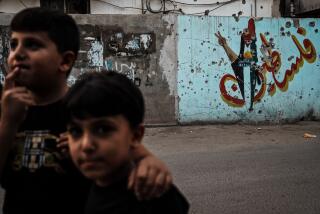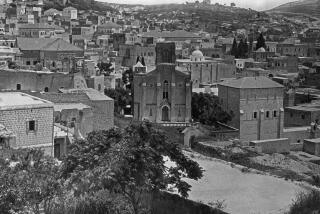Hussein Is Responsible for the Hatred
- Share via
Six years ago, as a reporter in Iraq, I was taken to a primary school to meet some children. In one class in particular, the teacher seemed eager to allow an exchange with her pupils. They were young children, perhaps 6 or 7 or 8 years old, sitting attentively at their wooden desks in a stark room devoid of decoration.
I told my government-assigned interpreter to tell them who I was and why I had come to visit their school. I can only hope what he said was fair. The children were expressionless until he came to the word “American,” and then some of them looked up in bewilderment tinged with fear. I asked the teacher if they would like to ask me questions.
Silence. Then a girl stood up and asked in a chilling monotone, with an eye on the teacher: “Why do Americans want to kill us?”
I thought of those children, their barren playground, their broken water fountain and dingy classrooms, last week when I saw boys on the streets of Fallouja cheering the torching and dismembering of American bodies. Some of them, manic with glee at the barbarity inflicted, looked about the right age to have been contemporaries of the children I met in 1998. Boys were also among the angry Shiite crowds in Najaf on Sunday, venting their hatred of Americans.
Those children or many others like them, young as they are, have a history to overcome. For years, from childhood, they sat under portraits of Saddam Hussein and were taught propaganda by teachers too loyal, too dependent on their small government salaries or too terrified to deviate from the regime’s line. All the problems of Iraq, these children were told over and over, were the fault of the U.S.
In family homes, few dared talk about the regime under which they all suffered. Children were taught to spy on their families. Parents who said the wrong thing could be hauled out at night to endure torture more sustained than that inflicted on the four U.S. contractors who met such horrible deaths last week.
That is the history all Iraqis must overcome: the years of brutality and terror, when the successful people were the killers, the smugglers, the Hussein loyalists. Violence is what these people did best, and many who thrived on that life are still at it.
Some of the anger against the U.S. today has a basis in real grievances. Although the embargo on Iraq was certainly eased considerably over the years, the sanctions that the U.S. insisted remain in place indefinitely had, tragically, helped to foster a criminal class of amoral con artists and ruthless flunkies willing to do whatever the Baath Party wanted, if only to stay alive and buy their kids new clothes and good food.
There was always plenty of food around; most people just couldn’t afford it. The only family I encountered in which the children said they ate meat every day was one where their father, they said, “sold watches on the street.” My interpreter muttered, in some disgust: “smuggler.” Decent, hardworking Iraqis, from intellectuals to hotel porters, could barely survive by comparison. A professor told me how it broke his heart not to be able to buy his children treats to celebrate the end of Ramadan.
But it wasn’t Americans who were diverting goods and money and building palaces for Hussein and his family. Iraqis knew that -- except, perhaps, the children, and it would be tragic if their recent experience with U.S. troops has not counterbalanced the rote anti-Americanism they were once taught in school.
Now we Americans see what years of deprivation, propaganda, anger, opportunism and life in a police state have wrought. It was a life inflicted on Iraq primarily by Hussein, who also took his people into two wars and carried out genocidal campaigns against the Shiites and Kurds he didn’t trust. A lot of Iraqis have a lot of psychological baggage to shed and lessons to unlearn, and this does not happen overnight.
We tend to be a solipsistic people. If Iraqis are out in the streets, apparently deranged by hate, a lot of us want to say the fault is somehow ours. But it isn’t necessarily something we did to them in the last 12 months that causes this behavior.
It is what Hussein did to them over a quarter of a century -- did to their culture, their civility and, above all, their children.
More to Read
Sign up for Essential California
The most important California stories and recommendations in your inbox every morning.
You may occasionally receive promotional content from the Los Angeles Times.













